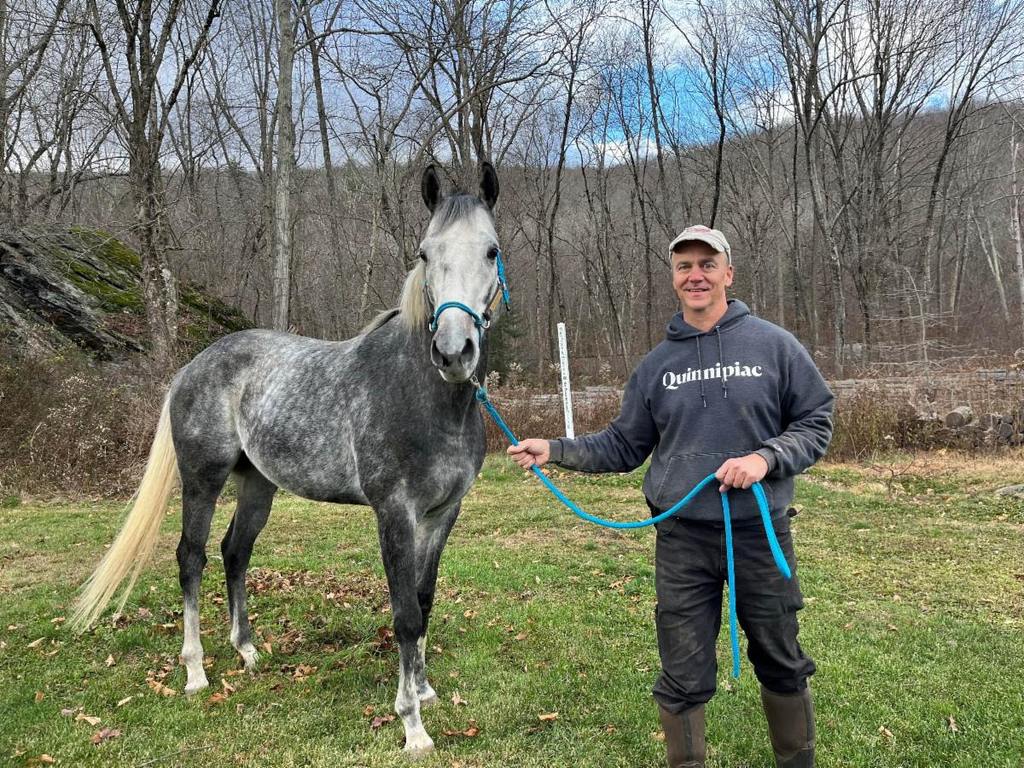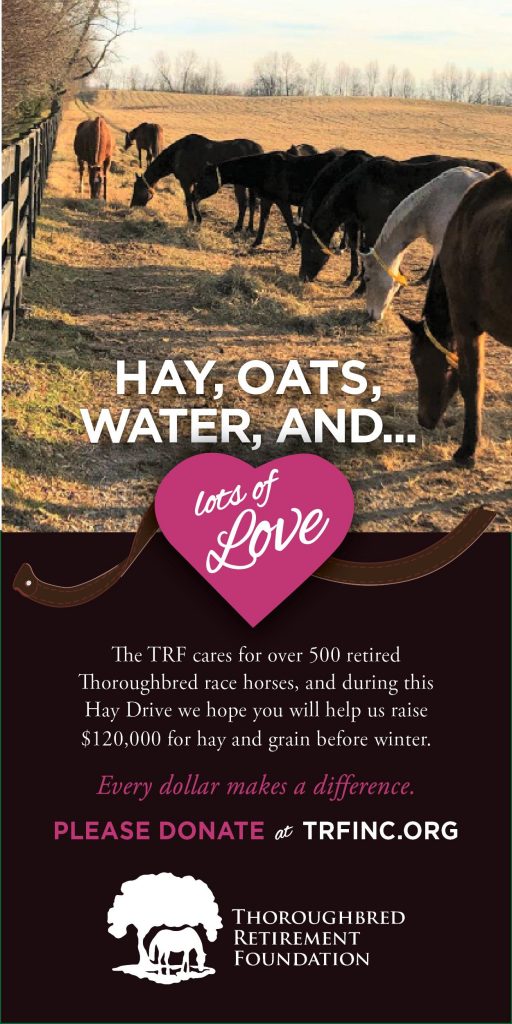
Montauk Traffic with Board President Alex Baxter (Lucky Orphans Photo)
By Mary Eddy – NYRA Press Office
ELMONT, N.Y.— Each May, Mental Health Awareness Month is recognized nationwide to bring attention to the importance of mental healthcare. Among the many therapies available to those with mental health struggles is equine-assisted therapy, a horsemanship-based program that provides support to patients.
Lucky Orphans Horse Rescue, located in Dover Plains, New York, is one of several programs across the country that offers equine-assisted therapy, utilizing horses like stakes-winner Montauk Traffic to create a meaningful and healing connection with the organization’s clients.
The late-running Montauk Traffic, who was campaigned by trainer Linda Rice and owner Chris Fountoukis, won 4-of-10 starts led by a victory in the $100,000 Jimmy Winkfield in 2020 at Aqueduct Racetrack. An injury in the summer of 2021 marked the end of his racing career and destined him for a quieter life without any further riding. But despite his physical limitations, Montauk Traffic has excelled at a newfound second career as a therapy horse.
Retired to the organization in the fall of 2021, Montauk Traffic now works closely with Lucky Orphans’ clients, teaching them patience and general equine husbandry skills as they work through an array of psychological challenges, including depression, anxiety, post-traumatic stress disorder (PTSD), attention deficit disorder, and autism, among others. The New York State Department of Health notes that each year, more than 1 in 5 New Yorkers display symptoms of a mental disorder.
Deanna Mancuso, founder and executive director of Lucky Orphans, said Montauk Traffic, or “Monte” as he’s known around the barn, has turned into an exceptional teacher and listener.
“He’s a little different than some other horses when you think of horses with second careers,” said Mancuso. “He has a fairly active career here and just the other day he spent two hours with some college psychology students. He is also part of the volunteer training to teach new volunteers about horse safety and communication. He’s very responsive and super sensitive, so he’s a great part of our program.”
Lucky Orphans, one of 81 organizations accredited by the Thoroughbred Aftercare Alliance (TAA), was founded by Mancuso with the mission, “people helping horses help people.” Mancuso, who previously ran a for-profit boarding center, was frequently asked to take in horses in need of proper sanctuary, and decided in 2013 to convert her business into a 501(c)3 non-profit equine rescue.
With her herd of rescued horses, Mancuso began to develop programs based on lessons taught to her by her grandfather, lessons that made her realize how her organization could help not just animals, but people, too.
“My grandfather was in the Korean War and when he returned home and suffered from PTSD, he said it was always a horse who brought him out of his darkest times,” Mancuso recalled. “Before he died of pancreatic cancer, he bought me a horse to help me through my dark times. All of our programs are based around that model of horses helping people get through anything.”
Monte is one of 49 horses, 20 of them thoroughbreds, that call Lucky Orphans home. He was placed there through the efforts of his former connections and the New York Thoroughbred Horsemen’s Association’s (NYTHA) TAKE THE LEAD program, which provides funds for veterinary exams and assistance in placing horses in new homes and careers once their racing careers have ended.
The New York Racing Association, Inc. (NYRA) and its horsemen are dedicated supporters of both the TAA and NYTHA’s TAKE THE LEAD programs, with every owner competing on the NYRA circuit donating $10 per start to the TAA and 1.5 percent of the purchase price of all claimed horses on the circuit to TAA and TAKE THE LEAD. Since 2014, this program has raised nearly $2 million collectively in support of aftercare.
While Monte has become an invaluable asset to Lucky Orphans’ programs, it was not always apparent the son of Cross Traffic would settle well into a quieter routine on the farm. Mancuso said it took plenty of handling and desensitizing to get Monte adjusted to life as a therapy horse.
“Looking at him and how powerful he was on the track is exactly how he is on the farm,” said Mancuso. “He went through a bit of a change and he kept acting like, ‘When’s the next race?’ After he was gelded, he was unpredictable and had some behaviors that made us wonder where he fit into the program. We worked with him and got him to settle, and now he’s so social and curious, intrigued by people and whatever is going on.”
The time Mancuso and the volunteers spent with Monte proved well worth the effort. While all the program horses are capable of supporting and teaching Lucky Orphans’ clients, Monte in particular has struck a chord with many. As a stakes-winning racehorse who overcame injury to live a meaningful life in retirement, Monte and his story provide even the most withdrawn clients with hope and inspiration.
“Here you have this amazing athlete who was eligible for the Breeders’ Cup, had so many come-from-behind victories, and had to retire,” said Mancuso. “This really resonates with our veterans – being at your prime and then having setbacks that they do not know how to process. These horses are amazing for that because they shift gears so much in retirement. He provides a level of support that they need.”
Mancuso said Monte is a prime example of the way thoroughbreds can happily transition to second careers beyond riding and jumping.
“A lot of people think we have a lot of limitations here because we don’t ride them, but we enjoy these horses so much,” said Mancuso. “To share what they can do for our clients is really life-changing.”
Monte participates in introductory education where new clients learn about general horsemanship and equine behavior, which leads into individually tailored program sessions.
“We have our clients tell us about themselves, we set goals, and then we teach about safety with the horses,” said Mancuso. “Depending on the goals, we’ll then set up with activities that includes grooming of the horses, leading them through obstacle courses, or having them open up and communicate with the horse. Even if we can’t hear them, it gets them talking out loud. It’s customized to each client and the sessions end with a discussion about what they’ve learned and assignment of homework around that.”
Mancuso explained that the program’s success can be attributed to the deep-rooted connections between horses and humans, and that to care for them is to care for each other.
“Horses have built who we are as a society,” said Mancuso. “Aftercare is so important as it shows our responsibility to the animal. It’s an invaluable thing, and to see what the thoroughbred industry is doing for aftercare is priceless for the people and the horses.”
Lucky Orphans, a 501(c)3 non-profit organization, is accredited by the Academy of Prosocial Learning, Natural Lifemanship, and Arenas For Change. For more information and to make a donation, visit https://www.luckyorphans.org/.



